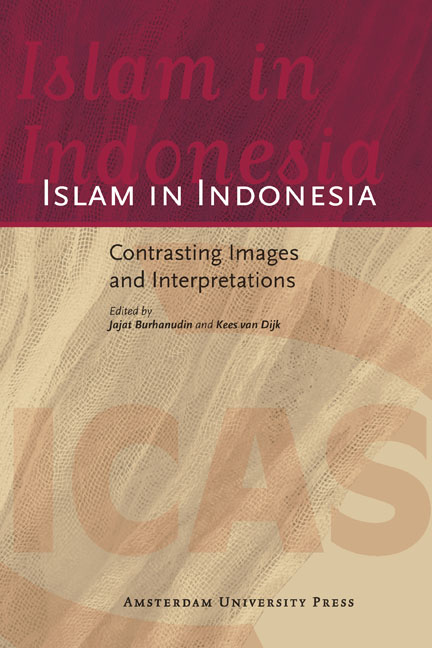Book contents
- Frontmatter
- Contents
- Introduction
- 1 Comparing Different streams of Islam: Wrestling with Words and Definitions
- 2 Defining Indonesian Islam: An Examination of the Construction of the National Islamic Identity of Traditionalist and Modernist Muslims
- 3 Indonesia in the Global Scheme of Islamic Things: Sustaining the Virtuous Circle of Education, Associations and Democracy
- 4 Distinguishing Indonesian Islam: Some Lessons to Learn
- 5 Islam, State and Society in Democratising Indonesia: A Historical Reflection
- 6 The Politics of Piety in the Pondok Pesantren Khusus Waria Al-Fattah Senin-Kamis Yogyakarta: Negotiating the Islamic Religious Embodiment
- 7 The Indonesian Muslim Feminist Reinterpretation of Inheritance
- 8 Managing Familial Issues: Unique Features of Legal Reform in Indonesia
- 9 A new Generation of Feminists within Traditional Islam: An Indonesian Exception
- 10 Religious Pluralism and Contested Religious Authority in Contemporary Indonesian Islam: A. Mustofa Bisri and Emha Ainun Nadjib
- 11 Islam and Humanitarian Affairs: The Middle Class and New Patterns of Social Activism
- 12 Dakwah radio in Surakarta: A Contest for Islamic Identity
- 13 Muslim Fundamentalism in Educational Institutions: A Case Study of Rohani Islam in High Schools in Cirebon
- 14 Majlis Tafsir Al-Qur’an and its Struggle for Islamic Reformism
- Glossary
- About the Editors and Contributors
- Bibliography
- Index
- Monographs
3 - Indonesia in the Global Scheme of Islamic Things: Sustaining the Virtuous Circle of Education, Associations and Democracy
Published online by Cambridge University Press: 09 January 2021
- Frontmatter
- Contents
- Introduction
- 1 Comparing Different streams of Islam: Wrestling with Words and Definitions
- 2 Defining Indonesian Islam: An Examination of the Construction of the National Islamic Identity of Traditionalist and Modernist Muslims
- 3 Indonesia in the Global Scheme of Islamic Things: Sustaining the Virtuous Circle of Education, Associations and Democracy
- 4 Distinguishing Indonesian Islam: Some Lessons to Learn
- 5 Islam, State and Society in Democratising Indonesia: A Historical Reflection
- 6 The Politics of Piety in the Pondok Pesantren Khusus Waria Al-Fattah Senin-Kamis Yogyakarta: Negotiating the Islamic Religious Embodiment
- 7 The Indonesian Muslim Feminist Reinterpretation of Inheritance
- 8 Managing Familial Issues: Unique Features of Legal Reform in Indonesia
- 9 A new Generation of Feminists within Traditional Islam: An Indonesian Exception
- 10 Religious Pluralism and Contested Religious Authority in Contemporary Indonesian Islam: A. Mustofa Bisri and Emha Ainun Nadjib
- 11 Islam and Humanitarian Affairs: The Middle Class and New Patterns of Social Activism
- 12 Dakwah radio in Surakarta: A Contest for Islamic Identity
- 13 Muslim Fundamentalism in Educational Institutions: A Case Study of Rohani Islam in High Schools in Cirebon
- 14 Majlis Tafsir Al-Qur’an and its Struggle for Islamic Reformism
- Glossary
- About the Editors and Contributors
- Bibliography
- Index
- Monographs
Summary
Is Muslim religious culture in Indonesia different? Do Indonesian solutions to Islamic issues in society have anything to contribute to the development of culture and politics in the Muslim world at large? Two generations ago, the most common answer to these questions would have been quickly affirmative on the first but resoundingly negative on the second. At that time, the conventional wisdom among Western and Muslim Middle Eastern scholars was that the Islam professed by most Indonesians was superficial or syncretic, and that the community of religiously educated and observant Muslims (the santri) was a minority, and rather culturally unsophisticated at that. That such a peripheral population might offer lessons for the larger Muslim world seemed presumptuous, to say the least (but see, as an exception, Hodgson 1974).
Whatever the accuracy of this historical characterisation, the situation of Islam in Indonesia today is entirely different. As both ethnographic and survey studies have demonstrated, Indonesia's Muslims tend these days to be quite observant, carrying out religious duties at rates comparable to or higher than Muslims in Morocco or Lebanon, and much higher than in Iran (Mujani & Liddle 2007; cf. Baktiari 2011). Islamic education in Indonesia is now so well institutionalised that, in contrast to the pattern of the 1950s and 1960s, all Muslim citizens receive basic (and state-mandated) training in the tenets of their faith. As a result of these and other changes, Indonesia is today a solidly Sunni sort of place in a way that, with its syncretic abangan, Wetu telu and gargantuan Communist Party, it had not been in the 1950s (see Hefner 2011a).
But the second question remains: does Indonesian Muslim culture offer lessons for other parts of the Muslim world? What I want to suggest here is that Indonesia is richly distinctive with regard to three socio-religious variables: religious education, associational life and constitutional politics. Religious education, I will suggest, has gone from being among the least comprehensive in the early twentieth century to being today among the more forward-looking and dynamic in the Muslim world. Indonesia's Islamic social welfare associations have also undergone a healthy evolution from being fractiously competitive and aliran-ised to being still competitive but, with the exception of a radical fringe, sharing an ‘operating consensus’ on the virtues of civic participation and social welfare as important ends in themselves.
- Type
- Chapter
- Information
- Islam in IndonesiaContrasting Images and Interpretations, pp. 49 - 62Publisher: Amsterdam University PressPrint publication year: 2013
- 1
- Cited by

